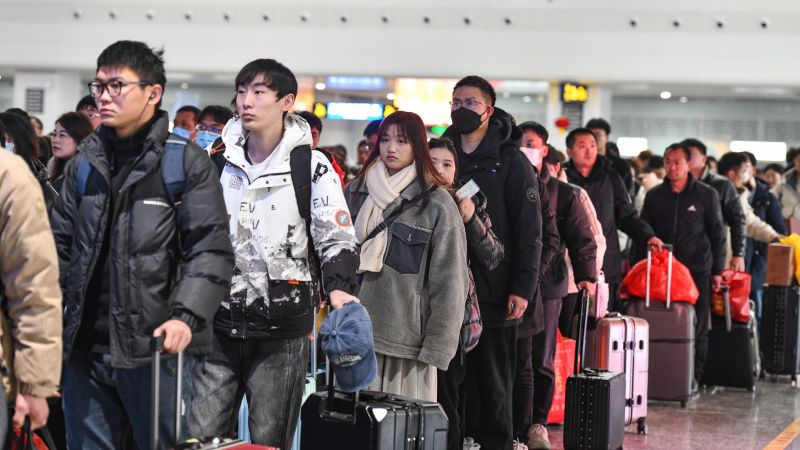Editor’s Note: Sign up for CNN’s Meanwhile in China newsletter, which explores what you need to know about the country’s rise and how it impacts the world.
China has reported a record upsurge in travel and consumption during a longer-than-usual Lunar New Year holiday season, touting the gains as signs that the world’s second largest economy is regaining its footing thanks to the government’s supportive policies.
But according to CNN calculations based on official data, the average tourism-related spending per trip was below pre-pandemic levels, as consumer confidence remains weak amid deflationary pressure.
A total of 474 million trips were made within mainland China during the Year of the Dragon travel season, up 34% compared to the same holiday in 2023 and 19% higher than in 2019, according to data published Sunday by the Ministry of Culture and Tourism.
Total spending by domestic tourists reached 632.7 billion yuan ($87.9 billion) during the holiday, it said.
However, the most recent holiday season took place over eight days from February 10 to February 18, which was one day more than previous periods.
“Supported by various favorable factors such as government policies, [services] supply, and propaganda work, people in urban and rural areas have exhibited a rising willingness to travel, with many indicators such as the number of trips and travel spending hitting record high levels,” the ministry said in a statement.
This Lunar New Year period is the longest in recent history. Previously, the holiday had lasted seven days. It was also the first holiday since 2019 that was completely unaffected by the impact of the Covid-19 pandemic.
The ministry did not provide details of the numbers of trips or spending by day. However, CNN calculations based on official data suggest the consumption level fell short of pre-pandemic levels.
On average, 59.25 million domestic trips per day were made during this holiday period, slightly lower than the 59.29 million trips per day taken in 2019.
An average of 166.85 yuan ($23.2) per trip per day was spent this year, down 6% from 2019s 176.9 yuan ($24.6).
Travel outside mainland China, including to Hong Kong and Macao, was also below pre-pandemic levels, if the official figures are averaged out.
A daily average of 1.69 million trips were made into and out of mainland China during the holiday, according to data provided Sunday by the National Immigration Administration. The figure was down 6% from 2019’s average of 1.79 million daily trips.
“Although we do see some strength in the data, we urge market participants to exercise caution,” Nomura analysts said in a Monday note.
“We maintain our view that the ongoing economic dip is likely to worsen into the spring,” they added.
China’s economy is grappling with a myriad of challenges, including low confidence and deflationary pressure. In January, consumer prices fell by their fastest pace in 15 years, marking a fourth straight month of decline.
There were some bright spots, though.
While the consumption of big-ticket items like property remained sluggish, purchases of inexpensive items boomed.
Movie ticket sales reached a record 8 billion yuan ($1.11 billion) during the eight-day holiday season, according to data released on Sunday by China Film Administration.
The number of people who went to the cinema, a total of 163 million, also hit a record high, it said.
But box office spending on its own wasn’t enough to dispel analyst concerns for growth this year.
A record downturn in real estate, which accounts for as much as 30% of gross domestic product and 70% of household wealth, has dealt a significant blow to business and consumer confidence.
“The property sector remains the main drag on economic growth,” said Frederic Neumann, chief Asia economist at HSBC.
“Falling construction is weighing on investment, hurting industries from steel, glass and cement to construction equipment makers, plumbers, and architects. At the same time, declining property prices are a drag on consumer spending as households sense a fall in their wealth,” he said.
During the holiday season, average daily new home sales in 25 major cities declined 27% compared to a year ago, according to the latest data from China Index Holdings, a leading private property research company.
The mixed economic data gave mainland Chinese markets a modest boost when they resumed trading on Monday after the holiday break, but the Hong Kong market, which has been trading since Wednesday, dropped.
“The headwinds to growth remain severe and it will take more than a bump in holiday travel for market sentiment to recover,” said Neumann. “In particular, investors are still looking for more stimulus to revive growth and are hoping greater details around housing sector stabilization measures.”
The Shanghai Composite and the Shenzhen Component were up 1.6% and 0.9% respectively, on their first trading day in the Year of Dragon.
Hong Kong’s Hang Seng Index, however, declined 1%, and was poised to reverse three straight days of gains.
China’s stock markets have suffered a protracted slump since recent peaks in 2021, with more than $6 trillion in market value having been wiped out from the Shanghai, Shenzhen and Hong Kong markets.
Read the full article here













